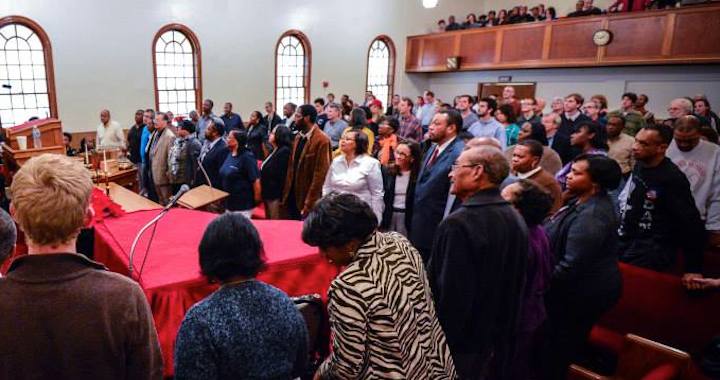Some days I’m not sure I know exactly what my job is, but one thing I end up doing quite a bit is hearing confessions.
Often these confessions come by email. Occasionally, I still get a handwritten letter. But the confessions that have stayed with me over the past few months are ones I’ve heard face-to-face, requested without a stated purpose.
“Could we sit down and talk sometime?”
Yes, I say. We plan a time. And when it comes, I sit across the table or porch or coffee cup—across the awkward silence—and await the bearing of a soul. These are sacred moments, each singular and distinct.
But lately they’ve had a theme: namely, whiteness.
I know (because people tell me) that this spiritual struggle with whiteness is connected to things happening in our world: widely-publicized stories of racial profiling, disparities in our criminal justice system, the #BlackLivesMatter movement, and race-baiting in political campaigns. For years I’ve been talking with black folks about the many-layered problems of whiteness. What’s noteworthy lately is that white folks want to talk about whiteness.
What’s more, the folks whose confessions I’ve heard realize that whiteness—whatever it is—is not just hurting people of color. It’s hurting them.
Whiteness, they tell me, is getting in the way of their relationship with God.
At least, that’s what I hear them saying. But these things are not easy to talk about because our language itself deceives us. Some people start by talking about “racism, ” noting how race itself is a myth and we’re never going to heal the wounds it has caused without exposing the lie. But you can’t begin to talk about the ways we’ve all been impacted by racism without talking about… well, race. The most pernicious thing about this lie is that we can’t understand our history without it.
Race shapes self-understanding as well as the way we see others. “Implicit racial bias, ” as it turns out, is verifiable. But race has also shaped systems, which means that it does not go away if we change our minds. Its assumptions have been written into governmental, academic, and economic policy. Racial intent isn’t necessary to perpetuate racial disparities. This lie is written into the fabric of our lives. We can “mean well” and go on being racist just the same.
Like I said, this is a problem that’s hard to nail down with words. But most folks I talk to these days have grappled with these personal and systemic dynamics of what we usually call “racism.” They know this lie hurts other people and they’d like to do what they can to stop it. They’ve heard people talk about being an “ally” and, while they’re not entirely sure what that means, they’re thinking about it. No one wants to believe that their way of life is at odds with a whole group of people.
But this, I’ve noticed, is where education about racism seems to run aground for so many of us who’ve been told that we’re white. Seeing a problem, we want to “do something about it.” But this desire—and the belief that we can, in fact, “do something”—is part of being white.
And this being white, I hear in my make-shift confessionals, is keeping us from being like Jesus, who did not have to “do something” to make everything work out right, but gave himself in love, showing us a better way.
How can we find that way in America today? This is the fundamental question I hear folks asking. And the questions itself gives me hope. Because “How can we help?” won’t transform us. For too long, on the political left and right in America, “How can we help?” has been the only question that we who assumed we were in charge could ask.
“How can we help poor people help themselves and take care of their families?” the so-called conservatives taught us to ask. Answering their own question, they created nonprofits and ministries that try to help people of color perform whiteness.
“How can we help dismantle a racist system?” the so-called liberals responded. Answering their own question, they built poverty management systems that employ people who’ve learned to perform whiteness to manage those who haven’t.
“How can we help?” hasn’t transformed us. But, “How can we find our way beyond whiteness?” is a question that gives me hope.
Nearly 50 years ago, in the book he published shortly before he was assassinated, Dr. King wrote, ““Whites… are not putting in a mass effort to reeducate themselves out of their racial ignorance. It is an aspect of their sense of superiority that the white people of America believe they have so little to learn.”
King was right: we have so much to learn—and to unlearn. But Jesus is a faithful teacher, inviting us to turn from whiteness toward that beloved community where we will know one another as we truly are in him.

